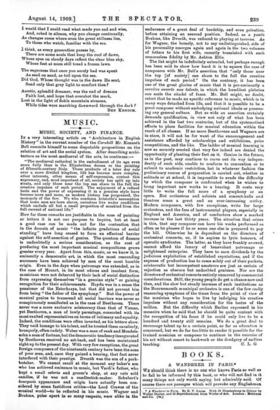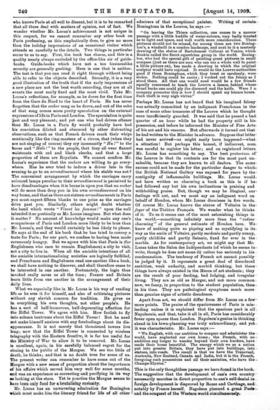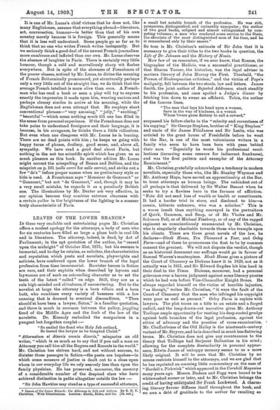BOOKS.
A WANDERER IN PARIS.*
WE should think there is no one who knows Paris so well as to fail to be informed by this book, or who will not find in it many things not only worth saying but admirably said. Of course there are passages which will provoke any Englishman • A Wanderer in Paris. By E. V. Lucas. With 16 Illustrations in Colour by Walter Dexter, and 32 Reproductions from Works of Art. London : Methuen And Co. [6s.] who knows Paris at all well to dissent, but it is to be remarked that all these deal with matters of opinion, not of fact. We wonder whether Mr. Lucas's achievement is not unique in this respect, for we cannot remember any other book on Paris professing, as this emphatically does, to give no more than the holiday impressions of an occasional visitor which attends so carefully to the details. Two things in particular occur to us to say. First, the book has charm, and this is a quality nearly always excluded by the office-like air of guide- books. Guide-books which have not a too businesslike severity are generally gushing. Here is one that is neither. The test is that you can read it right through without being able to refer to the objects described. Secondly, it is a very good illustration of the truth that if the early impressions of a new place are not the best worth recording, they are at all events the most easily fixed and the most vivid. Take Mr. Lucas's reflections, for example, as he drove for the first time from the Gare du Nord to the heart of Paris. He has never forgotten that the cocker sang as he drove, and out of the echo of that song comes some pretty speculation on the external expressions of life in Paris and London. The speculation iaquite 'just and very pleasant; and yet one who had driven oftener than Mr. Lucas in a Paris fly would probably have had his conviction diluted and obscured by other distracting observations, such as that French drivers crack their whips continually like the ring-masters of a circus, that (when they are not singing of course) they cry incessantly " Hu!" to the horse and " Hold, ! " to the people, that they all wear flannel waistcoats with red and black checks, and that a large proportion of them are Royalists. We cannot confirm Mr. Lucas's experience that the cochers are willing to go every- where. Has he ever tried to induce a driver late in the evening to go to an arrondissement where his stable was not ? The convenient arrangement by which the carriages carry coloured lamps peculiar to their arrondissement is perceived to have disadvantages when it is borne in upon you that no cocker will do more than drop you in his own arrondissement on his way home, and that as there are sixteen arrondissements in Paris you must expect fifteen blanks to one prize as the carriages drive past you. Similarly, others might doubt whether the band which wrote " Vivent les femmes ! " upon the wall intended it so poetically as Mr. Lucas imagines. But what does it matter ? No amount of knowledge would make any one's comparisons of Paris and London more likely to be true than
• Mr. Lucas's, and they would certainly be less likely to please.
He says at the end of his book that he has tried to convey a taste for Paris ; for our part, we confess to having been made ravenously hungry. But we agree with him that Paris is (for Englishmen who care to remain Englishmen) a city to visit, not a city to live in. When all the amiable intentions of all the amiable internationalising societies are logically fulfilled, and Frenchmen and Englishmen read one another like a book, we shall have nothing to discover, and shall therefore cease to be interested in one another. Fortunately, the logic thus invoked really saves us all the time ; France and Britain learn little from one another in the arrangement of their daily lives.
What we especially like in Mr. Lucas is his way of reading life as be sees it for himself, and also of criticising pictures without any slavish concern for tradition. He gives us in everything his own thoughts, not other people's. He has a sort of half-humorous, half-deprecating affection for the Eiffel Tower. We agree with him. How foolish to fly into solemn tantrums about the Eiffel Tower ! But he need not make himself anxious with any forebodings about its dis- appearance. It is not merely that threatened towers live long; now that the Eiffel Tower is connected by wireless telegraphy with the Eastern frontier, it is far too useful for the Ministry of War to allow it to be removed, Mr. Lucas is excellent, again, in his carefully balanced regret for the closing to the public of the Morgue. We see too little of death, he thinks ; and that is no doubt true for some of us. The present writer can remember to have come out of the Morgue with a new sense of proportion about the importance of his affairs-which served him very well for some months, and was an experience as correcting and purifying in its way as looking at the stars. Yet in practice the Morgue seems to have been only food for a brutalising curiosity.
Mr. Lucas has an unwavering admiration for Bonington which must make him the literary friend for life of all other admirers of that exceptional painter. Writing of certain. Boningtons in the Louvre, he says :—
"On leaving the Thiers collection, one comes to a narrow passage with a little huddle of water-colours, very badly treated as to light and space, and well worth more consideration. These- pictures should not be missed, for among them are two Boning-
ton's, a windmill in a sombre landscape, and next to it a masterly drawing of the statue of Bartolomme Colleoni at Venice, which
Ruskin called the finest equestrian group in the world. Boning- ton, who had the special gift of painting great pictures in small compass (just as there are men who can use a whole wall to paint. a little picture on), has made a drawing in which the original sculptor would have rejoiced. It would do the Louvre authorities good if these Boningtons, which they treat so carelessly, were• stolen. Nothing could be easier ; I worked out the felony as I stood there. All that one would need would be a few friends equally concerned to teach the Louvre a lesson, behind whose broad backs one could ply the diamond and the knife. Were I &. company promoter this is how I should spend my leisure hours. Such theft is very nigh virtue."
Perhaps Mr. Lucas has not heard that his imagined felony- was actually committed by an indignant Frenchman in the- case of some other treasures of the Louvre which he thought were insufficiently guarded. It was said that he passed a bad. quarter of an hour while he had the property still in his. possession, and before he informed the Minister of Fine Arts.
of his act and his reasons. But afterwards it turned out that he had written to the Minister in advance. Suppose that letter- had never arrived—as might easily have happened—what. a situation! But perhaps this honest, if indiscreet, man was careful to register his letter; and on registered letters Mr. Lucas has something to say. The best protection of' the Louvre is that its contents are for the most part un- saleable, because they are known to all dealers. The same - excuse could not be made for the particular danger to which?. the British National Gallery was exposed for years by the' contiguity of inflammable buildings. Mr. Lucas would.. not have written so charming a book as this is if he had followed any but his own inclinations in praising and withholding praise. But, though we may be illogical, our- feelings will out, and we must say an indignant word on behalf of Houdon, whom Mr. Lucas dismisses in five words. Of course Mr. Lucas knows the statue of Voltaire in the' foyer of the Theatre Francais. We wonder what he thinks
of it. To us it seems one of the most astonishing things in the world,—something infinitely more than the "rather
charming" of the general estimate of Houdon here. We' know of nothing quite so piquing and so mystifying in its - way as the smile of Voltaire, partly sardonic and partly sunny, partly childlike and partly Satanic, fixed for ever in the - marble. As for contemporary art, we might say that Mr. Lucas takes the Salon des Independants (of which he seems to write, though he does not name it) rather too seriously in his. condemnation. The tendency of French art cannot possibly•
be judged by it. It represents a great deal of disordered ambition, weak audacity, and morbid thinking, but these' things have always existed in the Mecca of art students ; they are the result of poor feeding, bad lodging, and irregular - living. They are as old as Murger, and not more common. now, we fancy, in proportion to the student population, than- in his time. They are pathological symptoms much more than genuine signs of artistic decadence.
Apart from art, we should differ from Mr. Lucas on a few- more points. The praise of the spaciousness of Paris is mis- leading unless it is explained that the spacious part is all Napoleonic, and that, take it all in all, Paris has considerably fewer open spaces than London. Napoleon's genius in thinking - ahead in his town-planning was truly extraordinary, and yet - it was characteristic. Mr. Lucas says :—
"We English, with our ambition to conquer and administer the . world, have neglected our own home ; the French, with no - ambition any longer to wander beyond their own borders, have made their home beautiful. The energy which we as a nation put into greater Britain, they have put into buildings, into - statues, into roads. The result is that we have the Transvaal; Australia, New Zealand, Canada and India, but it is the French, foregoing such possessions and all their anxieties, who have the Champs-Elysées."
This is the only thoughtless passage we have found in the book. The suggestion that the development of one's own country necessarily marches in direct proportion to one's self-denial in foreign development is disproved by Rome and Carthage, and. notably by France herself. Napoleon planned a great Paris' . and the conquest of the Western world simultaneously. It is one of Mr. Lucas's chief virtues that lie does not, like many Englishmen, assume that everything abroad—literature, art, conversation, humour—is better than that of his own country merely because it is foreign. This generally means that it is less well understood. Some people go so far as to think that no one who writes French writes inelegantly. But we seriously think a good deal of the newest French journalism more cumbrous and inflated than our own. Mr. Lucas observes the absence of laughter in Paris. There is certainly very little humour, though a cold and marvellously sharp wit flashes everywhere. But in spite of the slowness of Frenchmen of the poorer classes, noticed by Mr. Lucas, to divine the meaning of French Britannically pronounced, yet structurally perhaps only a very little out of the straight line, we do think that the average French intellect is more alive than ours. A French- man who has read a book or Been a play will try to express exactly the impression it made upon him, weaving curious and perhaps clumsy similes to arrive at his meaning, while the Englishman does not even attempt that. He employs short conventional phrases—" very amusing," "jolly," "exciting," "beautiful"—which mean nothing much till one has filled in the sense from personal experience. If the Frenchman does not take pains to understand foreigners and their language, it is because, in his arrogance, he thinks them a little ridiculous. But even when one disagrees with Mr. Lucas be is bracing. There are no dead points with him ; he keeps us going with 'happy turns of phrase, drollery, good sense, and, above all, sympathy. We have read a good deal about Paris, but nothing in the not too scientific spirit which has given us so much pleasure as this book. In another edition Mr. Lucas might correct the misspelling of Rena.n and Delibes, and the misprint on p. 101 (salle corre for sails carree), and strike out a few " de's " before 'proper names when no preliminary style or title is used. A Frenchman says "Monsieur de Goncourt" or "Goncourt," but not "de Goncourt," and, though it may be a very small mistake, he regards it as a peculiarly British one. The illustrations by Mr. Dexter al; very effective, in our opinion because they combine extreme clearness with a certain pallor in the brightness of the lighting in a manner truly characteristic of Paris.








































 Previous page
Previous page